On October 17, 1969, fourteen Black student athletes at the University of Wyoming approached their football coach with a difficult subject. They wanted to meet and discuss the possibility of non-violent protest, like wearing black armbands, during an upcoming game against Brigham Young University. They wanted to express their thoughts on the stated racist policies and beliefs of the Mormon Church. Their coach, Lloyd Eaton, fired them on the spot.
Around the fiftieth anniversary of the protest and racist dismissal, The Crisis Magazine published an article about the event that featured interviews with the players. Jarrett Bell, the NFL columnist for USA Today and a member of the Pro Football Hall of Fame Selection Committee, wrote:
According to seven of the players, interviewed via a conference call, Eaton began the meeting with a declaration: “Gentlemen, let me save you a lot of time. You are no longer Wyoming Cowboys.”
When the players tried to respond, they said Eaton snapped, “Shut up.”
Then came the racial invectives. He made disparaging comments about Black fatherhood. He told players they should transfer to Historically Black Colleges and Universities (HBCUs) that would tolerate protests. He claimed to rescue players from dire situations by giving them scholarships. And so on.
“The last thing he said to us was that we could go get on ‘Negro Relief,’” remembers Ted Williams, alluding to a derogatory term at the time for public assistance programs. “That hurt. I’m not a violent person, but I almost did something. But when I looked at the group, the group was so calm.”
A half-century before former San Francisco 49ers quarterback Colin Kaepernick was blackballed by the NFL for sparking a movement as he protested the murders of unarmed African Americans by police and other social injustices by taking a knee during the national anthem, few have heard about what happened to the former Wyoming players dubbed “The Black 14.”
The players considered wearing armbands in the next day’s game to support the Black Student Alliance, which aligned with similar statements at other schools in denouncing the Mormon Church policy that barred African Americans from priesthood. The Mormon Church is the parent institution for BYU. Also, several players who played in the previous year’s contest against BYU at Provo, Utah, were inspired to protest because they contended they were subjected to racial slurs from BYU players during the game — behavior that was ignored by coaches and game officials.
“This story still has a lot of relevance today, given the political climate in the country right now and some of the license to say things and ignore things in terms of civil rights and human rights,” said Guillermo Hysaw, who, in 1969, was the primary spokesman for his fellow players during the ordeal. “Even though 50 years ago you might have thought differently, it was really about denial of First Amendment rights.”
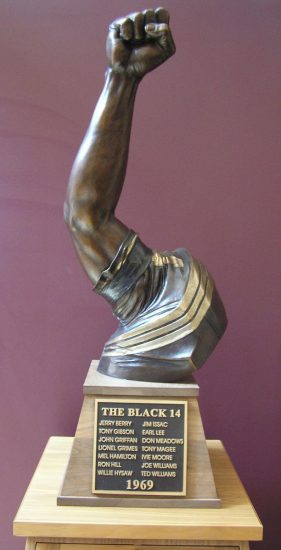
With funding from the Associated Students of UW, a bronze sculpture by Guadalupe Barajas of Cheyenne was placed in the basement of the Wyoming Union and dedicated in 2002. Source: Tom Rea via the University of Wyoming
BlackPast.org describes the memorialization and recognition of the fourteen men decades later:
Despite their dismissal, several of the 14 received college degrees from Wyoming and other institutions. Jerry Berry, one of the 14, became a sports anchor for TV stations in Tulsa, Oklahoma, Chicago, Illinois, and Detroit, Michigan. In 2002, a statue to the 14 was erected in the Student Union on the University of Wyoming campus. In 2009, the 40th anniversary of the Black 14, the LDS Institute at the University of Wyoming made black arm bands in tribute to the events of 1969 and handed them out to all in attendance.
There is a history of Black athletes exercising their 1st Amendment rights on the field. Some of the more famous examples are Colin Kaepernick and John Carlos, both of whom risked their careers by standing up (or taking a knee) against white supremacy. See the article by Dave Zirin, The Missouri Tigers and the Hidden History of Black College Football Activists, to learn more about student protestors.
To find out more about the Wyoming players, see the Wyoming State Historical Society. Additionally, ESPN Sports Center produced a short film about the Black 14 in 2017, in which several of the players themselves speak about the experience and its meaning.
Black 14 film
Directed by Darius Clark Monroe and executive produced by Spike Lee, this documentary short tells the story of what happened when a group of college athletes decided to protest a long-standing racial injustice.

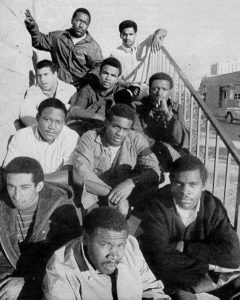
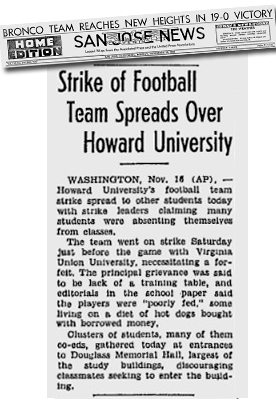
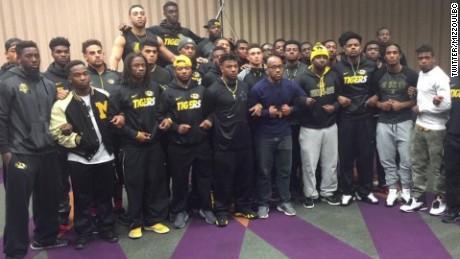
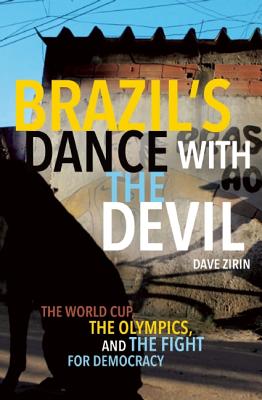
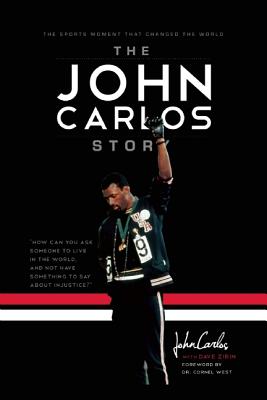
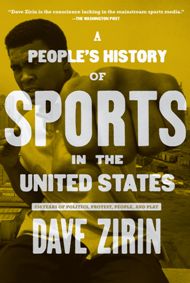
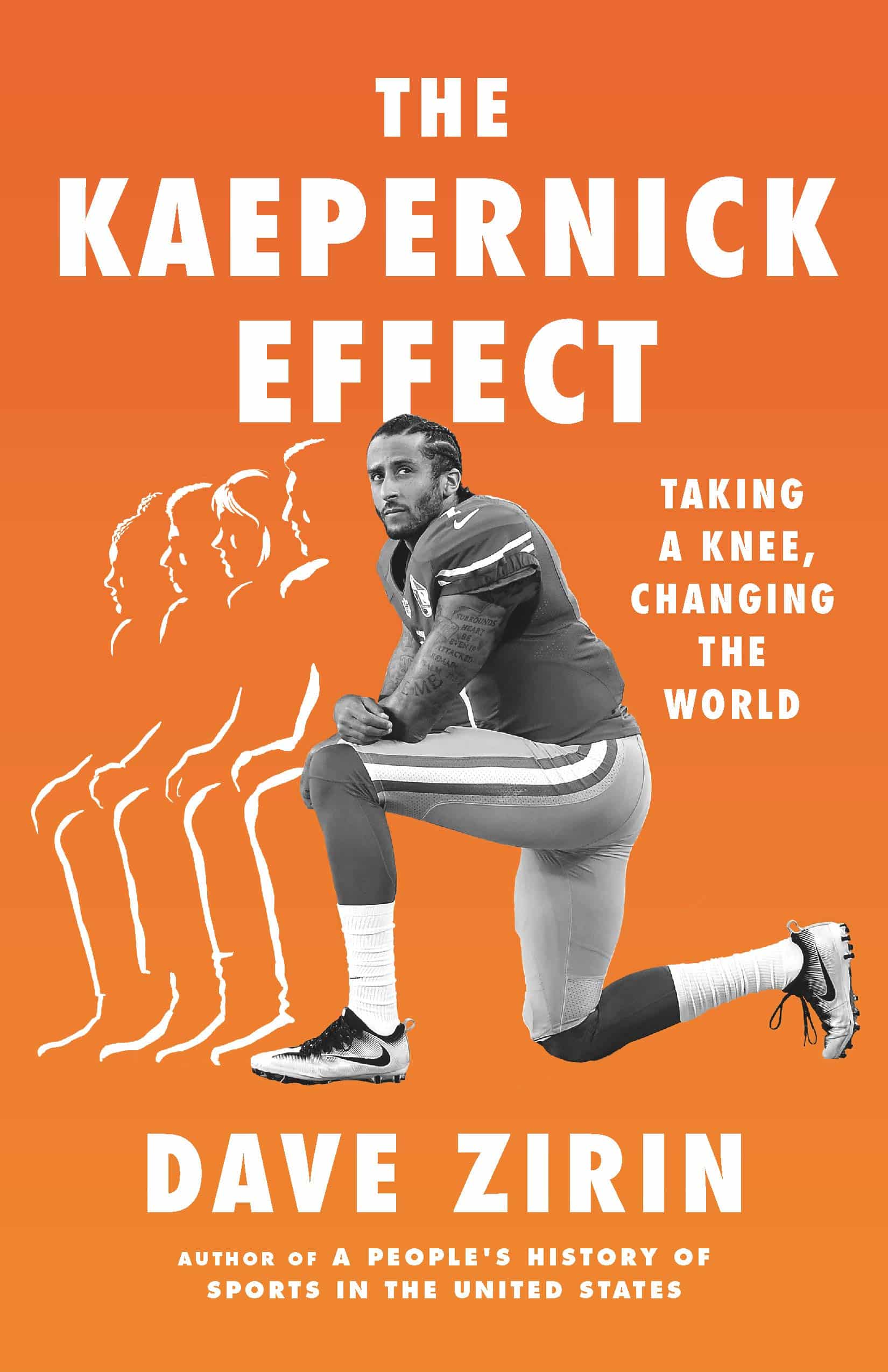








Twitter
Google plus
LinkedIn